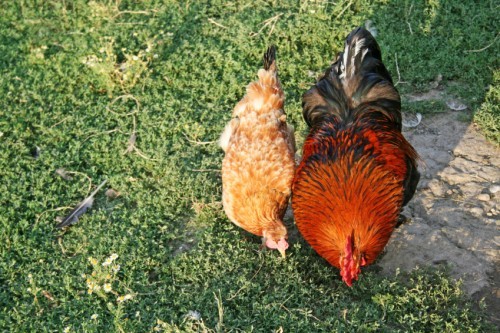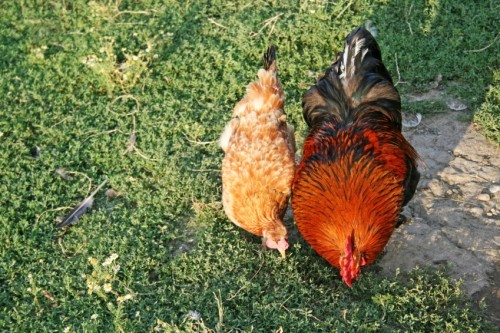Send your question to Umbra!
Q. Dear Umbra,
Vegans don’t eat eggs because it’s an animal product like honey and milk and also because of how animals are treated. However, does eating an egg kill a baby chick that could have had a life? I am a vegetarian and people often argue that the eggs in the grocery store are not fertilized and would never have a life. Is that really true? I know being vegan is the best way of living but does eating eggs really kill something that could have had a life? It would be great to get your opinion.
Harshita S.
Cambridge, Mass.
A. Dearest Harshita,
 One foot on the floor.It is not my opinion but rather a fact that if a hen’s egg has not been fertilized by a rooster, no embryo or chick will form. In general, an egg sold in a grocery store will not have been fertilized. There is a chance that you are shopping at a small store that carries eggs from small-scale producers, and in this case a rooster might be at the henhouse and the eggs might be fertilized. However, even a fertilized egg is unlikely to result in a life. Let us back up for a moment.
One foot on the floor.It is not my opinion but rather a fact that if a hen’s egg has not been fertilized by a rooster, no embryo or chick will form. In general, an egg sold in a grocery store will not have been fertilized. There is a chance that you are shopping at a small store that carries eggs from small-scale producers, and in this case a rooster might be at the henhouse and the eggs might be fertilized. However, even a fertilized egg is unlikely to result in a life. Let us back up for a moment.
Hens, like women, produce eggs whether or not there is a chance of fertilization. Hens have one ovary, which regularly forms yolks inside its follicular sac. When the yolk is ready, the sac breaks open and releases it into the oviduct. If a hen happens to have a fresh set of sperm from a rooster stored in her infundibulum (the opening of the oviduct), the sperm gets a chance to fertilize the yolk. Whether this occurs or not, the albumen and shell are added in layers to form the complete egg as the yolk continues on a journey through the oviduct. When the egg is completely formed and the hen is ready to push it out, taa daa! Some hens will lay an egg per day.
A fertilized chicken embryo will grow and hatch in about 21 days if the right conditions are met, that is, if it is kept at 80 degrees. Either a hen must brood upon the egg until it hatches, or it must be incubated in a heated machine designed for the purpose. Few breeds of chicken will still brood, as this habit is inconvenient to the egg farmer and has been removed from the genes.
To recap, two things must be present for an egg to have a life: roosters and incubators. It is unusual for either of these conditions to be in place on a modern egg farm. Either the farm is such that tens of thousands of hens are in small cages pumping out eggs, with neither rooster nor free space in site. Or the chickens are roaming around, with perhaps a rooster or several roosters ruling the roost, but the farmer is in the egg-selling business and collects every egg to bring to your store. The only way an egg is a potential life is if that farmer sometimes collects and incubates her own eggs, and your egg happens to be fertilized but was not chosen to hatch out. So you see I am really stretching the possibilities here.
Here’s the thing: if you do choose to eat eggs, despite the captivity of the birds, you should be buying eggs from small egg operations. These operations should have freely ranging chickens, and may have roosters. Hence, if you are going to eat eggs, it is better to buy and eat the ones that extremely hypothetically might have resulted in a live chick. Large-scale chicken egg farming is economically, ethically, and environmentally repugnant.
Mildly,
Umbra


